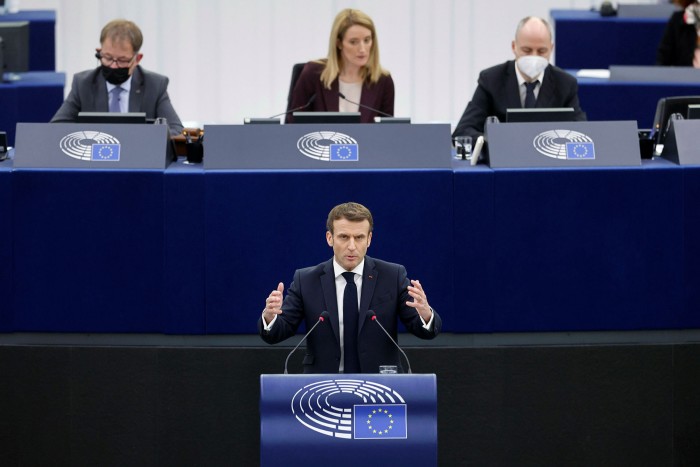
[ad_1]
US President Joe Biden predicted Russia would “move in” on Ukraine, and warned an invasion would be a “disaster” for Vladimir Putin, as he urged the west to remain united in holding Moscow “accountable” for any aggression.
At a news conference in Washington on Wednesday, Biden said Russia would “pay a stiff price, immediately, short-term, medium-term and long-term” in the event of an invasion of its neighbour Ukraine.
However, the US president’s comments on the western response to Russian aggression were muddied by his suggestion that a “minor incursion” into Ukraine might yield lighter retaliation, which the White House was later forced to clarify.
“If any Russian military forces move across the Ukrainian border, that’s a renewed invasion, and it will be met with a swift, severe, and united response from the United States and our Allies,” said Jen Psaki, the White House press secretary.
“President Biden also knows from long experience that the Russians have an extensive playbook of aggression short of military action, including cyber attacks and paramilitary tactics. And he affirmed today that those acts of Russian aggression will be met with a decisive, reciprocal, and united response,” she added.
A senior administration official added that “if the Russian military, conventional military forces are acquiring land, in Ukraine, through force, in violation of Ukraine’s territorial integrity and sovereignty, that’s an invasion . . . whether it’s a small portion of territory or acquiring a large portion of territory, that’s still an invasion”.
Biden’s remarks and the subsequent clarifications follow escalating warnings from senior US officials who now believe Russia’s attack on Ukraine could happen at any moment and are desperately trying to cobble together last-minute measures of deterrence and potential punishment for Moscow with European allies.
“I think he is saying out loud what everybody understands: that it is increasingly likely that something is going to happen, and nobody knows right now whether they are going to move their forces 10 or 20 miles, or whether they’re going to try to move all the way into Kyiv,” said Chris Murphy, a Democratic senator on the foreign relations committee who had just returned from a visit to Ukraine.
“What I know is that he is putting together a set of crushing sanctions that hopefully will be enough to dissuade,” he told reporters.
Biden acknowledged there were still “differences” among western allies on the details of their reaction, which needed to be cleared up. “It’s very important that we keep everyone in Nato on the same page. That’s what I’m spending a lot of time doing. And there are differences . . . in Nato as to what countries are willing to do,” he said.

Biden’s comments came as Emmanuel Macron, France’s president, called on the EU to forge its own plan for “security and stability” with Russia, in a move that risks undermining western solidarity in the face of Kremlin aggression towards Ukraine.
In a speech to the European Parliament, Macron called for EU states to “conduct their own dialogue” with Russia rather than support diplomatic efforts led by the US and Nato, in sharp contrast to a plea from Antony Blinken, US secretary of state, for “unity”.
Macron said that despite the joint EU-US diplomacy, Europeans had to offer Russia a solution to de-escalate tensions with Moscow in the “coming weeks”.
“We should build as Europeans working with other Europeans and with Nato and then propose it for negotiation with Russia,” he told MEPs in Strasbourg on Wednesday. “It is good that Europeans and the United States co-ordinate, but it is necessary that Europeans conduct their own dialogue.”
Macron’s intervention is the first example of public dissent between Nato members since the US first warned of a potential Russian attack on Ukraine more than two months ago.
It also breaks a united front between the EU and US on Russia, underpinned by what officials have described as unprecedented levels of diplomatic outreach by the US to engage Brussels in the dialogue with Moscow.
Speaking during a visit to Kyiv on Wednesday, Blinken stressed the need for a unified approach ahead of his planned meeting with Sergei Lavrov, his Russian counterpart, in Geneva on Friday.
“The strength of our diplomacy, our deterrence and any response to Moscow’s aggression demands unity among allies and partners, as well as within Ukraine,” he said.
Russia has long sought to sideline the EU in favour of negotiating with individual countries. Sergei Ryabkov, Russia’s deputy foreign minister, pushed back against broader multinational talks, saying Moscow would prefer to deal primarily with the US.
“We would prefer to find an understanding and do a deal with the Americans foremost. Bringing in too broad a circle of countries into these processes seems counterproductive to us,” he said.
[ad_2]
Source link